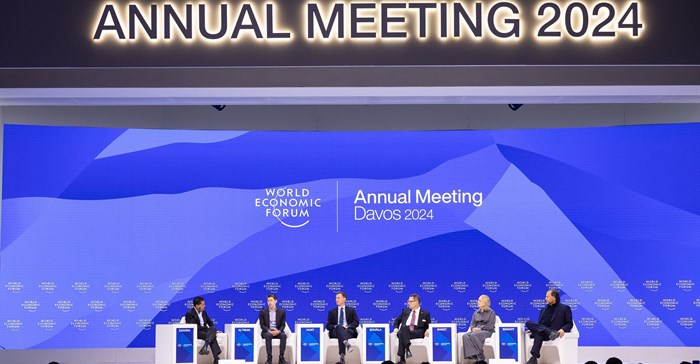
Source: WEF
WEF Sam Altman, CEO of OpenAI; Marc Benioff, chair and CEO of Salesforce; Albert Bourla, CEO of Pfizer; Jeremy Hunt, chancellor of the Exchequer of the UK; Julie Sweet, chair and CEO of Accenture; and CNN host Fareed Zakaria speak about technological advances on 18 January
- AI's probability of doom
There was no mistaking the most popular topic on the Davos agenda this year, with AI serving as the subject of far too many sessions.
Most of these focused on the technology's utility and impact, without necessarily taking into account the rising distrust of innovation revealed by Edelman's Trust Barometer.
"Two-thirds told us the system is biased to the wealthy," said Edelman CEO Richard Edelman. "It should all be a big warning sign — you're going too fast, I don't feel heard. We're charging ahead as if it's all assumed to be good, and it's not by many people. They are scared for their jobs."
Very little discussion, furthermore, considered AI's potential as a source of reputation risk, which is likely to become increasingly pronounced as corporates find themselves deploying the technologies across all aspects of their services.
Much of the discussion, according to Ruder Finn CEO Kathy Bloomgarden, revolved instead around tech doomerism — or the p(doom) score as it referred to.
"The prevailing opinion is optimistic that AI will unlock productivity and prosperity," says Bloomgarden. "But good AI needs a sound data infrastructure, labour force flexibility and training, sustained innovation and strong ethics and governance. We need to be intentional about these four factors. Today we are not prepared, but we can get there."
For communicators, says Bloomgarden, the accelerated pace of change means they cannot avoid a period of intense disruption — either for themselves or for their companies and colleagues.
"We need to form partnerships that benefit all and show that they create enterprise value. At the centre of this, communicators and business leaders must focus on an inspiring vision of the future and an optimistic belief in what is possible."
- Disinformation and division
Taking the top spot in WEF's annual risk report, the perils of fake news — amplified by social media and AI — continue to vex minds, especially in a year when two billion people are set to vote.
Washington Post CEO William Lewis described the threat as "very significant", while Meta oversight board member Helle Thorning-Schmidt admitted that social media giants must do more to tackle mis and disinformation on private messaging platforms like WhatsApp.
Many at Davos would probably prefer that any regulation remains a similarly elusive goal — so it is hard to see how disinformation, whether state-sponsored or not, can be effectively tackled in today's online media environment.
Whether deepfakes are banned or not, websites hosting AI-created fake news have increased by more than 1,000% since May, increasing from 49 sites to more than 600, according to NewsGuard, an organisation that tracks misinformation. Needless to say, whatever works in the political environment will be employed in the corporate realm.
That so many people are willing to believe and share this content also reflects the more fundamental disconnect that is as relevant for the business world as it is for the state of global democracy.
- Culture wars make for cautious corporates
DEI and sustainability were on the agenda at Davos this year, but the backlash against ESG and DEI has escalated over the past couple of years.
These include the Disney opposed attacks on the LGBTQ community, the violent protests that followed efforts by Anheuser-Busch’s Bud Light brand to include all Americans in its marketing campaign and the threat of physical violence against employees of Starbucks and Twitter and others that supported Pride Month.
It’s not surprising that CEOs are reluctant to face the kind of social media outrage and threats of physical violence that are triggered these days by efforts to do the right thing.
"A lot of companies are pulling back because ESG is seen as a dirty word," said the marketing head at one of the world's biggest consumer companies, on condition of anonymity.
"Business leaders are backing away from the language of inclusion," said Vista Equity CEO Robert Smith at a separate Fast Company/Verizon event.
While many might applaud the end of unfettered brand activism as a necessary correction to rampant virtue signalling, it is also hard to avoid the conclusion that companies are simply less willing to accommodate the discomfort associated with efforts to tackle societal issues.
- Geopolitics looms large
The various geopolitical conflicts and tensions around the world were impossible to avoid across the Davos fringe, reflecting rising anxiety despite an improving economic picture compared to 12 months ago.
"What's not going the right way is all this uncertainty with geopolitics," said Bloomberg TV anchor Francine Lacqua, speaking to Mubadala CCO Brian Lott at a Page reception.
"The world is shifting, and geopolitics is probably a symptom of that."Indeed, a new survey of comms leaders by Page identified geopolitics as the primary risk to business for the year ahead, closely followed by concerns about polarisation.
While these trends will make the business environment more challenging for multinational corporations and agencies alike, they also have a significant real-world impact on public affairs and communications decisions.
While it does not necessarily spell bad news for public affairs and communications specialists - being called on to provide counsel, it does sound a cautionary note for the various challenges of our time — including climate change, disinformation, AI and security — that do require meaningful collaboration.






































